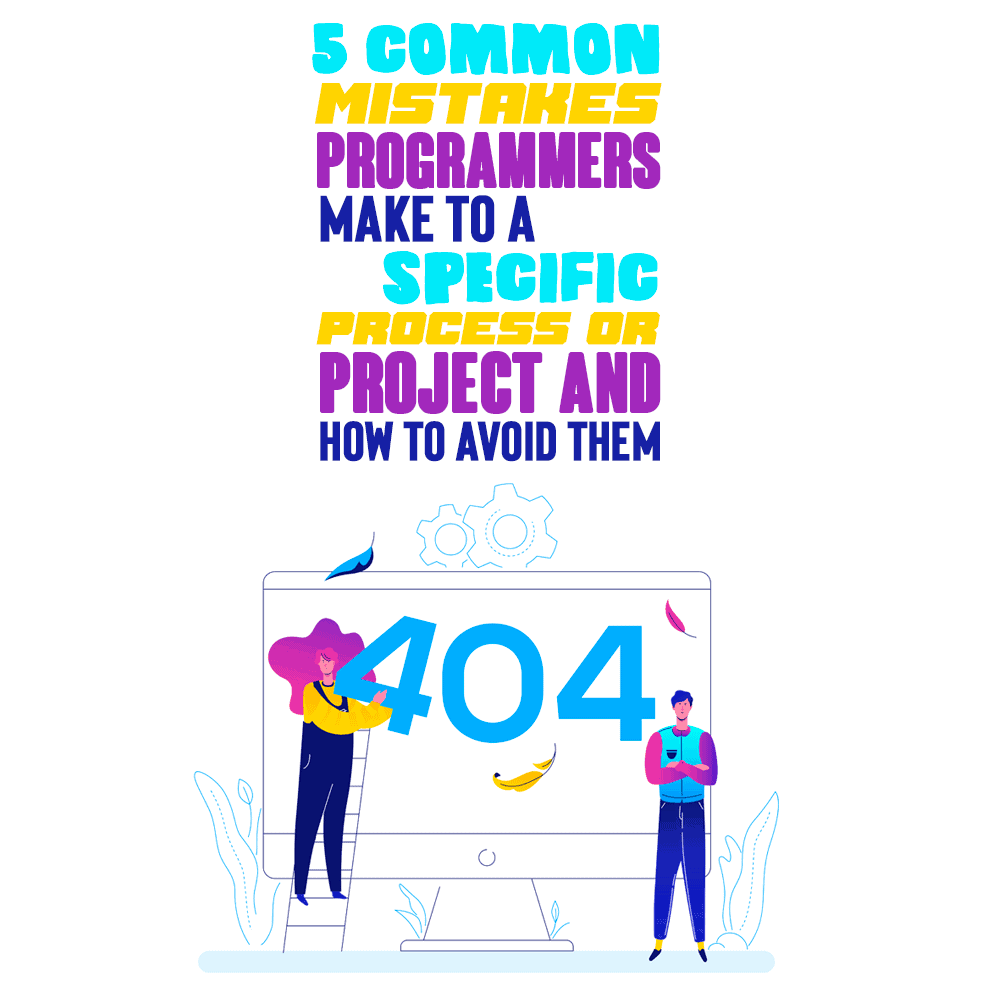 Programming mistakes are going to happen from time to time. Even the most brilliant coders make errors occasionally. We’re all human, after all!
Programming mistakes are going to happen from time to time. Even the most brilliant coders make errors occasionally. We’re all human, after all!
With that said, programming requires precision and accuracy to function properly. If a programmer makes too many errors, their code simply won’t work. Occasional errors shouldn’t be an issue if your code isn’t responsible for life-and-death situations, but frequent mistakes could cost you credibility or even your job.
If you want to be a better programmer, you need to understand the most common mistakes so you can avoid them. Here are five mistakes you should avoid making.
Before We Talk Programming Mistakes … Let’s Talk About Errors
Errors can exist almost anywhere in a program, but there are three main types of errors that can cause bugs in the code. These three error types are:
- Syntax
- Logic
- Runtime
The syntax of a programming language describes how the code should be written to function properly. While many coders know several programming languages, there are significant differences between them, and syntax errors can make a program completely non-functional. Misspellings and missing brackets are just two examples of syntax errors.
Logic errors are unlikely to stop a program from running altogether but may make it behave in unexpected ways. Occasionally, programmers accidentally create an infinite loop, which is an example of a logic error. These can be the most difficult errors to pinpoint.
Finally, runtime errors occur when the program runs. These errors can cause crashes.
Programming mistakes don’t always result in errors, but it’s crucial to know what kind of error you’re dealing with when they do come up. No programmer can avoid errors altogether, but understanding how they work can help to minimize them.
Common Programming Mistakes & How To Avoid Them
1. Bad Variable Naming
When writing code, you should always strive to be as clear as possible. When you or someone else returns to the code, they should be able to understand it right away. That means avoiding single-letter variable names and unclear abbreviations.
Don’t make your variable names obscure (i.e., don’t make something up). You’ll only make it harder for anyone who needs to work with the code later. Don’t try to be clever or creative when naming variables! Clarity is much more important.
2. Not Using Comments
Again, this comes back to making your code easy to interpret. Programmers have to make their code clear and easy to understand for both man and machine.
You may eventually have colleagues reviewing or even making changes to your code. Some novices don’t use comments at all, which can make it hard to read the code or make the work look extremely messy.
On the flip side, it is possible to use too many comments. They can get in the way, provide redundant information, and require maintenance. Before you make a comment, ask yourself: Is this really necessary?
Use comments when there is a chance that the code is not self-explanatory to a competent programmer. Some good applications for comments include making notes after fixing a bug, using external references, and explaining code that might seem unnecessary but is essential to the program remaining functional. Remember, though, a good comment doesn’t make up for bad code.
3. Lack of Consistency
Many new programmers don’t think about code maintenance down the line. But if someone revisits your code months or years later, they’re going to be very, very annoyed if your code lacks consistency. Programming is an abstract art, even within established languages, and you have to create your conventions at the beginning of every project and stick to them.
What does this look like? Well, it can involve several different factors, including consistency across naming conventions, code format (such as bracket placement), and method design. Many organizations have style guides that programmers are expected to follow.
You might argue that it doesn’t matter as long as the code works. But if you’ve ever had to work with someone else’s inconsistent programming work, you know how irritating it is to come across differences in naming and conventions..
4. Creating Clunky Functions
Functions should be broken up if necessary to create clean and streamlined code. Think about maintenance! If you create large functions, it becomes clunky to maintain the program. Smaller functions are easier to work with and allow for more focused maintenance.
Creating a functional program is easier if you simplify things as much as possible. Simplicity can actually feel like more work but a great programmer understands the power of keeping things simple to reduce work later on.
5. Not Asking Questions
You might feel self-conscious if you’re struggling with something or you’re not sure how to proceed. That’s normal! But refusing to ask questions can get you into major trouble.
There are lots of resources online, so it’s always a good idea to see if your question has already been answered before asking someone directly. A basic question like “what is a palindrome string” probably doesn’t need to go to your boss. But if you have a specific question about code you’re working on and you can’t find the answer, ask!
People who have been in the industry for a long time are usually very happy to share their knowledge. They love to talk about code. Go ahead and ask your questions—you’ll become a better programmer and avoid many programming mistakes. A mentor, boss, colleague, or teacher should be able to help you!
Other Mistakes To Avoid
Choose An Obscure Programming language

Not Backing Up Your Code!
Almost everyone knows the pain of losing a school paper because they forgot to hit “save.” The same goes for your code. Back it up consistently—you’ll never regret saving your work, but you’ll always regret losing it.
Programming While You’re Tired
Working when you’re tired is never a good idea. It can lead to sloppiness and decision fatigue, leading to errors. You’ll be more productive after a good night’s sleep!
Getting Lazy
A lot of the most common programming mistakes come down to laziness and sloppy work. Don’t cut corners and make life harder for anyone who has to work on your code. Take your time, be consistent, and create code you can be proud of!
Avoid These Mistakes and Be A Star Programmer
Everyone makes mistakes. But these mistakes are often avoidable with a little extra care and attention to detail. As a programmer, you should set out to do more than create functional programs—you should aim to create functional programs that humans, as well as computers, can understand.
Star programmers aren’t always the people creating the most innovative programs. Sometimes, they’re simply the people creating programs that work and stand the test of time. Become a star programmer by making life easier for yourself and your colleagues with clean, mistake-free code.
